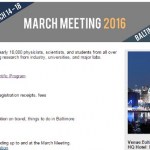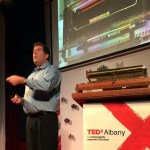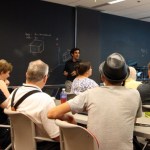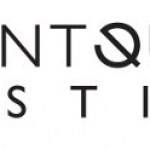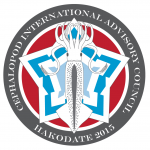conferences
I'm going to be at the March Meeting of the American Physical Society in Baltimore next week. This is the largest physics meeting of the year, with an emphasis on condensed matter physics (which is actually the largest single area of study within physics, though media overemphasis on particle physics and astrophysics might lead you to think otherwise). The program for the meeting is, um, kind of intimidating.
So, this post has two purposes:
1) If you're also going to be at the March Meeting, let me know, and maybe we can arrange some kind of bloggy-people meet-up.
2) More importantly, if…
As you probably already know, last year we ran a workshop at the Joint Quantum Institute for science-fiction writers who would like to learn more about quantum physics. The workshop was a lot of fun from the speaker/oragnizer side, and very well received by last year's writers, so we're doing it again:
The Schrödinger Sessions is a three-day workshop for science fiction writers offering a “crash course” in modern physics, to be held at the Joint Quantum Institute (JQI), one of the world’s leading research centers for the study of quantum mechanics. We will introduce participants to…
I've been really, really bad about using this blog to promote stuff I have coming up, but I'll be doing two public-ish appearances in the month of March, and I probably ought to announce those here:
1) Next week, on Wednesday, March 2, I'll be giving the Physics Colloquium at the University of Illinois, on public communication stuff:
"Talking Dogs and Galileian Blogs: Social Media for Communicating Science"
Modern social media technologies provide an unprecedented opportunity to engage and inform a broad audience about the practice and products of science. Such outreach efforts are…
A couple of weeks ago, I gave a talk at TEDxAlbany on how quantum physics manifests in everyday life. I posted the approximate text back then, but TEDx has now put up the video:
So, if you've been wondering what it sounded like live, well, now you can see...
So, yesterday was my big TEDxAlbany talk. I was the first speaker scheduled, probably because I gave them the title "The Exotic Physics of an Ordinary Morning," so it seemed appropriate to have me talking while people were still eating breakfast...
The abstract I wrote when I did the proposal mentions both quantum physics and relativity, but when I actually wrote the talk, that made for a really awkward transition, so it's all quantum, all the time. I cover quite a bit of ground-- the no-animation-effects version of the slides is 42 slides and Word has it as just over 2500 words written out…
It will be a fine day to be glued to the computer, because TONMOCON VI is happening, and this year they'll be broadcasting it on the internet.
Some day I will be there, when I'm not stretched thin and tied down with classes.
Over in Tumblr-land, Ben Lillie has an interesting post on all the stuff that goes on behind the scenes of a science talk. It's an intimidatingly long list of stuff, in quite a range of different areas. But this is a solved problem in other performance fields:
And that raises and interesting question, since aside from the science section (and not even all of that), all of these apply to any other performance or production. So how do those people master all of those things? The short answer is that they don’t. Almost any production that requires a long, and more importantly disparate, set of…
Last weekend was our APS-funded outreach workshop The Schrödinger Sessions: Science for Science Fiction, held at the Joint Quantum Institute at the University of Maryland. The workshop offered a three-day "crash course" on quantum physics to 17 science fiction writers from a variety of media-- we had novelists, short-story writers, screenwriters, and at least one poet. The goal was to provide a basic grounding in quantum physics and a look at current research in hopes of informing and inspiring new stories that will, in turn, inspire the audience for those stories to look more deeply into the…
I've been doing a bunch of conferencing recently, what with DAMOP a few weeks ago and then Convergence last week. This prompted me to write up a couple of posts about conference-related things, which I posted over at Forbes. These were apparently a pretty bad fit for the folks reading over there, as they've gotten very little traffic relative to, well, everything else I've posted during that span. Live and learn.
Anyway, I'm fairly happy with how both of those turned out, and on the off chance that they'll do better with the ScienceBlogs crowd, let me link them here:
-- What Are Academic…
I spent the last few days in Ontario, attending the Convergence meeting at the Perimeter Institute. This brought a bunch of Perimeter alumni and other big names together for a series of talks and discussions about the current state and future course of physics.
My role at this was basically to impersonate a journalist, and I had a MEDIA credential to prove it. I did a series of posts at Forbes about different aspects of the meeting:
-- The Laser Cavity was Flooded: a revisiting of the idea of True Lab Stories, which was a loose series of funny disaster tales from the early days of…
I'm at DAMOP this week, though it took longer to get here than it should've-- severe storms yesterday canceled the flight I was supposed to take from Baltimore to Columbus, so I had to rebook to the 6am departure this morning, whee. I think this is the first time I've ever had a flight canceled while I was at the airport, though which is kind of amazing.
Anyway, I missed most of the morning session, and I'm short on sleep, but I saw some cool talks already, and expect to write about some of them tomorrow. For the moment, though, here's a post I wrote for Forbes yesterday talking about why…
We'll be accepting applications for The Schrödinger Sessions workshop at JQI through tomorrow. We already have 80-plus applicants for fewer than 20 planned spots, including a couple of authors I really, really like and some folks who have won awards, etc., so we're going to have our work cut out for us picking the attendees...
We're also discussing the program for the workshop-- more details when we have something more final-- which has me thinking about good examples to use of storytelling involving quantum physics. I'd like to be able to give a few shout-outs to already-existing fiction…
I've updated the detailed blog post describing our summer workshop introducing writers to quantum physics to include a link to the application form. For the benefit of those who read via RSS, though, and don't follow me on Twitter: the application form is now live, and will be for the next few weeks. We expect to make acceptance decisions around April 1.
So, if you make up stories and the idea of spending a few days at the Joint Quantum Institute learning about quantum physics from some of the world's leading experts sounds like fun, well, send us an application.
A few years back, I became aware of Mike Brotherton's Launch Pad Astronomy Workshop, and said "somebody should do this for quantum physics." At the time, I wasn't in a position to do that, but in the interim, the APS Outreach program launched the Public Outreach and Informing the Public Grant program, providing smallish grants for new public outreach efforts. So, because I apparently don't have enough on my plate as it is, I floated the idea with Steve Rolston at Maryland (my immediate supervisor when I was a grad student), who liked it, and we put together a proposal with their Director of…
CIAC
Unfortunately, this event is not on my calendar: the Cephalopod International Advisory Council (CIAC) is meeting 8-14 November in Hakodate, Japan, to discuss recent advances in cephalopod science (pdf). It looks delightful. I've always wanted to visit Japan. But alas, all I can do is tell you you should go.
As mentioned briefly here and on Twitter, I spent the past week at the Renaissance Weekend in Charleston, SC. This is a biggish smart-people festival, running for 30-odd years now, bringing together a wide array of people from politics, finance, science, and the arts. Bill Phillips has been going to it for years (though he wasn't there this year), so when I got the invitation, I jumped at it.
Unfortunately for blog purposes, they have a strict policy about everything said there being off the record, so I can't post really detailed stories about anything, but it was a very cool experience. And…
That's "Science Online" as in the conference that folded, not "science, online" as in the practice of trying to understand the universe from in front of a networked computer. Specifically, I'm posting about David Zaslavsky's call for help in putting together a replacement meeting. There was a lot of talk about this right when Science Online went under, but that's pretty much died down, at least in public. David's trying to get something more active going.
This is, of course, a massive undertaking, and something fraught with peril. And it's not like I have any free time to make really…
They announced their decision to shut down the organization and cancel future conferences yesterday. This is sad news -- it has always been an innovative, interesting event, but they faced a terrible hit when one of their founders, Bora Zivkovic, was slammed with charges of harassing women, and they've been struggling to get donations to support the organization. I suspect they may also have gotten a bit over-extended, too, since they'd been creating satellite conferences on narrower topics at different locations (which was an excellent idea, by the way, but may not have been wise if their…
Matt "Dean Dad" Reed has a post about the issue of academic conference travel, which is expensive and often the first thing cut out of college budgets. Which leaves faculty either disconnected from their field, or paying out-of-pocket to attend meetings that they need to demonstrate their scholarly productivity. This, in turn, tends to skew research meetings even more toward those at elite schools with big budgets.
This is a hard problem to crack, because the issue isn't just money but time. Reed suggests dropping "the charade of the last half day" because it requires an extra night in a…
Having just returned from a long trip where I gave three talks, one of the first things I saw when I started following social media closely again was this post on how to do better presentations. The advice is the usual stuff-- more images, less text, don't read your slides, and for God's sake, rehearse the talk before you give it-- and it's generally very good. Given the two very different types of presentation I gave over the last few weeks, though, I think it's important to add one note about the design of the visuals, which is this: when you're putting a talk together, keep the final…
